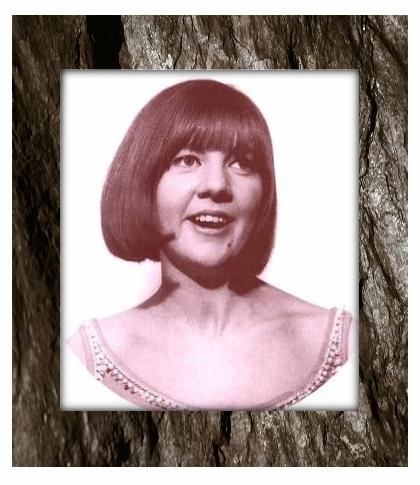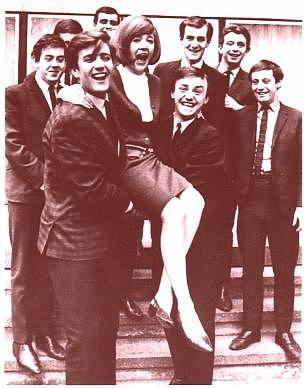
Brief introduction: Scholastic Magazines published a book on British pop music back in 1966. The authors intended writing style was geared mainly towards the young adult reader who would be just ripe for fresh young minds interested in rock and roll. That said, this report by Caroline Silver does contain many candid remarks from Cilla Black regarding Liverpool's early beat scene as well as her rise to fame. The Ottawa
- John Whelan, Chief Researcher for the Ottawa Beatles Site, July 13, 2002.
Starting Out: Cilla Black
written by Caroline Silver,
published in December, 1966
by Scholastic Magazines, Inc.
In October 1962 a new hat-check girl started work at the Cavern. She was
seventeen years old, a slim five-feet-five-inches, with bright red hair and dark
blue eyes. Her name was Priscilla Maria Veronica White, Cilla to her friends.
She was a beat fan.
Cilla was born in Liverpool on May 27, 1945. She went to school at St. Anthony's
Secondary Modern, where she became interested in acting. When she was nine she
made her first appearance onstage in a school production of Little Red Riding
Hood. Three years later she was in
Julius Caesar, and end-of-term play.
In England, boys and girls usually go to separate schools. St. Anthony's
was an all-girl school. On week-ends, boys and girls would get together to go to
the beach or have a party. At a party in Liverpool, everybody must do a "turn" -- sing a number,
recite a poem, do a tap dance -- even if he is not very good at it. Cilla's turn
was always a song.
In 1958 she left school and took a secretarial course, then got a job as a
typist with a cable manufacturing company in Liverpool. In the evenings she went
the rounds to the beat clubs with her school friends, listening to many of the
newly formed groups. All the Liverpool groups who were later to become famous --
among them the Beatles, Gerry and the Pacemakers, Billy J. Kramer and the Dakotas -- were
playing in the Liverpool clubs in the late 1950's. Cilla knew many of them by sight, as
they had gone to her local boys' school. Later, she got to know them all.
"In all these clubs you made a point of making friends with everybody," she
says. "It was rather like a glorified YMCA. I used to collect a lot of
autographs and watch a lot of performers because I was very much interested in
show business. Deep down in my heart I knew I was going to be a singer."
By October 1962 Cilla was working at the Cavern in her lunch hours, hanging up
coats for five shillings (60 cents) an hour. "That way I could listen to the
music and get paid for it," she says. She was particularly friendly with a group
called Rory Storm and the Hurricanes. "We were part of a clique, a gang. We all
used to go to the beach on Sundays. Ringo Starr was the drummer for them at the
time."

Brian Epstein once described Cilla Black's arrival on the pop music scene as "Britain's most exciting new beat songstress. The gal with the bright red hair and the jet black voice". How true his words were...Cilla had a string of many hits: "Alfie", "Love of the Loved" "Anyone Who Had A Heart" and "Step Inside Love".
One day when Rory Storm was playing at the Cavern he handed the microphone to Cilla. "He asked me, for giggles, to get up on the stage and sing with them. They thought: 'Oh, Cilla's a bit of a case -- she'll do anything for a laugh.' And probably the lead singer wanted to have a rest anyway."So Cilla got up on the stage and took up the lyric of "Fever" where Rory Storm
left off, belting it out in her strong voice. Then they made her sing
"Always" and some R-&-B numbers.
Word of Cilla's performance quickly spread among the Liverpool groups, because
at that time there were no girl singers in the city, so she was a novelty. In
the weeks following, every time she went to a club she would be pointed out by
somebody and would be made to get up and sing.
Soon a group called the Big Three suggested that, instead of Cilla's singing
with everybody and not earning anything, she should sing with them only, and for
pay. Shortly after this,
and advertisement appeared in the local newspapers: "Come and see Swinging
Priscilla at the Zodiac tonight."
"I've always been called Cilla," she says, "so it never occurred to me that the
Priscilla in the advertisement might be me. After work, I couldn't wait to wash
my face and put new makeup
on to go down to the Zodiac and see who this 'Swinging Priscilla' was. When I
got to the door -- it was marvelous. These clubs, because you'd go down to the
cellar and it'd have a little trap, sort of an eye, like a cat door only about
five feet up the door, and you'd knock three times and a piece of wood would
slide back and they'd say, 'Who is it? -- and that night I said, 'It's me.' And
they said, 'Oh, good. Glad you came tonight because we couldn't think how to get
hold of you, and you're on in a half hour!' And I said, 'On?' I beg your
pardon!' And
they said, 'You're singing with the Big Three.' And I said, 'Oh no, I'm not!'
"They blackmailed me, actually. They said if I didn't sing with the Big Three I
would be barred from the Zodiac. And to be barred from this particular club,
which was at the height of its popularity, was the worst thing that could ever
happen to me. Without this club there was no other place to go, because although
the other clubs were still going they weren't 'in' at the time; the Zodiac was
the 'in' club of the moment. So I just had to do it.
"I went off to a chemist's and got a lot of cough sweets because I thought
they'd make my voice better. And I got terribly temperamental -- a thing which
I'd never done in my life -- because I was going to sing. And I remember my
tongue was black with all these black cough sweets
when I was singing. But it was very successful night. I enjoyed it."
She sang for about twenty minutes. At the end of the session, to her great
astonishment, the leader of the Big Three slipped three ten-shilling notes
($4.20) into her pocket. Cilla had become a paid performer.
So Cilla began with the Big Three as "Swinging Cilla," and became well-known
among the Liverpool groups. Although officially a group member, she still used
to sing with other groups. So did everyone else. Group members were always ready
to split up and play with other groups for fun at clubs. Jam sessions were held
in the evenings at the Iron Door, the Cavern, the Mardi Gras, the Black Cat, the
Peppermint Lounge, and at many other Liverpool clubs, as well as the Zodiac.
Cilla's favorite clubs were the Iron Door and the Cavern, but she always
remained particularly fond of the Zodiac because it was the first club at which
she sang regularly.
Then a local pop-music newspaper called Merseybeat wrote an article about Cilla
and got her name mixed up. "They knew my name was a color of some sort, but they
didn't know whether it was Black or White. So they printed it Black." The
Beatles soon told their manager, Brian Epstein, that Cilla was a promising young
singer, and Epstein became interested in managing her. He, too, thought her name
was Cilla Black, and wrote it so in the contract he eventually signed with her.
"When I told Brian my real name was Cilla White, he didn't like it much," she
says. "Because by now everyone was so used to calling me Cilla Black that they
couldn't imagine me
Cilla White, so we kept it Cilla Black."
The color mix-up was characteristic also of Cilla's life at that point. Cilla
White went on working during the day as a typist. At night, Cilla Black sang in
the clubs, looking forward to making a record when Epstein had time to arrange
it. The Beatles were becoming very popular in the summer of 1963, so their
manager had his hands full and Cilla had to wait.
Her turn came in August, when she took her annual two weeks' holiday from her
typing job. She went to London with Brian Epstein and was introduced to
recording manager George Martin, who had already heard and liked tapes she made
with Gerry and the Pacemakers. Cilla enjoyed it all; Epstein showed her off as
his new talent, and this, plus the fact that she is naturally outgoing and
friendly, made her not in the least frightened. By the end of the week she had
got to know a lot of people in the recording world and was feeling sufficiently
relaxed to go into a recording studio and make a record. "I was a bit nervous at
first," she says, "because all the musicians in the studio were strangers, and
so far I'd only sung with people I knew. But once I got started there was no
turning back."
The song Cilla recorded was "Love of the Loved" by Lennon and McCartney. Those
involved in the
recording were so pleased with the result that Cilla no longer had any doubts
about where she was going next. She went home and handed in her notice to her
Liverpool boss. Two weeks later she began to call herself a professional singer.
"Love of the Loved" shot up the British pop music charts, and Cilla went off on
a concert tour with Gerry and the Pacemakers. She returned to London in time to
appear in the Beatles' Christmas Show at Finsbury Park, Astoria, London. Early
in 1964, her second record made number
one on the British Hit Parade; so did her third, which was released while Cilla
was appearing in Star-time at the London Palladium.
Cilla played the Palladium from May to December 1964, and was chosen (as
Palladian resident performers always are) to sing before the Queen in that
year's Royal Variety Performance. Since then, she has made many more records,
has toured Australia and New Zealand, has appeared in
America on The Ed Sullivan Show and on Shindig, and has often been on British
television. She has done cabaret performances in different parts of the world,
including a three-week season in New York at the Plaza Hotel's Persian Room. And
during the winter of 1965-66 she played
Little Red Riding Hood on a London stage (which, she says, was nothing like her
nine-year-old school performance).
Cilla is a splendid example of the amateur-made-good spirit typical of British
pop in the early 1960s. "I've never had any training," she says. "Nobody told me
how to sing, or what to do at a certain point of a song, how to introduce songs.
Not even Brian Epstein, because Brian didn't know -- he was just as much an
amateur as we were!"

Cilla Black in an off-beat moment with Gerry and the
Pacemakers and the Dakotas.